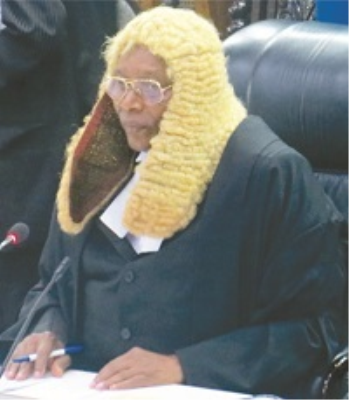The Parliamentary Special Select Committee on Fake Degrees in collaboration with the Conference of Vice Chancellors and Principals (CVCP-SL) and the Tertiary Education Commission (TEC) engaged representative stakeholders regulating the education sector, university administrations (public & private), public employing institutions, exams body, Anti-Corruption, investigators & prosecutors of the alleged fake degree scandal and students victims of the alleged fake degree syndicate, in a validation workshop held on Thursday, March 16th, 2023 at the Multi-Purpose Building at Fourah Bay College.
The purpose of the workshop was to discuss long-term systemic solutions to the proliferation of fake qualifications in Sierra Leone.
In his welcome address, the Deputy Vice Chancellor of Fourah Bay College, Professor K. Mansaray welcomed participants and said that the issue of fake degrees was serious and alarming as key stakeholders in academia were named by the whistle-blower. Professor Mansaray also said that Fourah Bay College has taken key steps in safeguarding the institution on issues relating to fake degrees & certificates.
In setting the tone of the validation workshop, the Chairman of the Special Select Committee Hon. Dr. Kandeh Kolleh Yumkella said that the Committee wanted all stakeholders interviewed to see how their submissions have been compiled to see whether the Committee captured their ideas/solutions they proffered during the Hearings. “Some of you are meeting the Committee for the first time because you agreed with us that massive proliferation of fake degrees and certificates pose a major threat to the quality, validity, reliability, and integrity of our educational system. So, join us to consider solutions to fix the system and to co-create a robust and effective regulatory environment to minimize its occurrence in Sierra Leone”, he appealed.
Hon. Dr. Yumkella referenced studies in the USA, Germany, India, Pakistan, and the SADC region that have shown that the proliferation of fake degrees has been exacerbated by advances in technology, national corruption, and state failure. He said the studies suggest that the growing demand for degrees, certificates, and diplomas for access to jobs, promotions, higher incomes, status and prestige, and political power has led to what some researchers have called, “credentialism or the credential society in which class, status and social mobility becomes intricately linked to possession of qualification”.
Dr. Yumkella reiterated that during the Hearings, the Committee received evidence of many forms of academic corruption and illegitimate practices within our educational system that are similar to other countries.To solve the problem, he went on, collaboration is needed among policymakers, regulators, employers, managers of the academies, and a broader mobilization of the society at large to reject academic corruption.
“That is why you are all here from these diverse backgrounds. Please note that Parliament and the Government take this very seriously and that is why the focus of the Committee is not to create a sensation on this issue but to work with the relevant stakeholders to come up with systemic solutions that will be tabled in Parliament and for the attention of the President”, he stated.
Making his statement, the Deputy Minister of the Ministry of Technical and Higher Education, Mr. Aziz Kamara re-echoed the government’s commitment to quality education and noted that there is already a cabinet conclusion for revising the Tertiary Education Act (TEC) to help address these challenges.
The Minister said the proliferation of fake degrees is a scar attempting to smear our collective effort and the vision of the President and that the government is taking it very seriously.
Dr. David Sengeh, the Minister of Basic and Senior Secondary School Education described the work of the Parliamentary Special Select Committee as robust and thorough as he was engaged during the Hearings and that the documents that he has seen so far reflect the views he expressed. The Minister went further to recommend that among the key next steps, the digitization of academic records should be an immediate priority for all academic institutions in the country.
The detailed discussions on the findings on the causes and pervasiveness of the fake degrees and the systemic recommendations from stakeholders were co-chaired by Honourable Joseph Williams Lamin and Professor Edwin J.J. Momoh on the one hand, and Professor Yekini Alghali and Mrs. Yvonne Gibrill on the other hand.
Mr. Mohamed Alpha Jalloh, Secretary to the Special Select Committee and also the Director of Strategy & Parliamentary Studies, presented the findings on the submission & testimonies of the stakeholders relating to the causes and pervasiveness of fake degrees in the country. While, Hon. Mohamed Lansana, a member of the Parliamentary Special Select Committee on Fake Degrees and also the Committee Chairman for Higher Education, presented the systemic recommendation/solutions proffered by stakeholders in fixing the system to discourage fake degrees in the country.
The discussions were open and frank and clarifications were made and additional causes and systemic solutions were added. Participants also went through the proposed action plan page by page examining the action, the timeline, the proposed lead, and support institutions. Additional actions and some adjustments were made on timelines and lead and support institutions.
The Parliamentary Special Select Committee specifically appealed to stakeholders with additional information to send to the Committee Secretariat for inclusion in the final report.
In his closing remarks, Professor Father Joe Turay, Vice Chancellor of the University of Makeni thanked the stakeholders for their commitment, vitality, and willingness to work together in addressing the issue of fake degrees. He said Sierra Leone needs this energy and willingness to fix the system and therefore encouraged all stakeholders to continue to work to ensure that the findings of the report are implemented.

